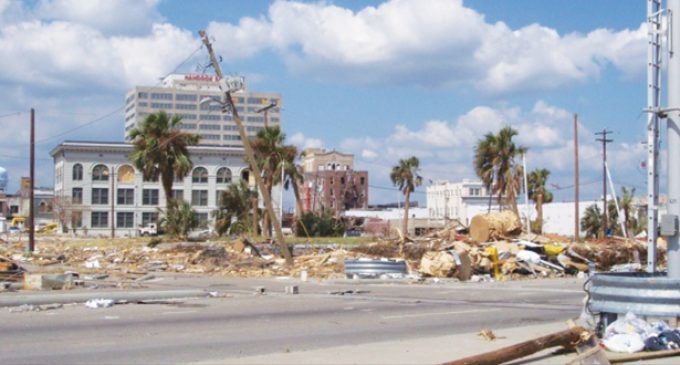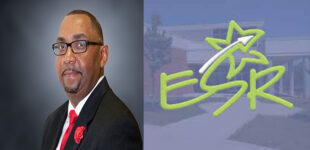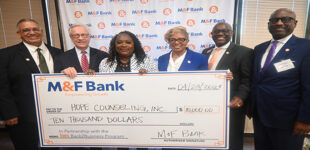Remembering the tragedy and charity after Katrina

Above: Photo by NC-1 DMAT- A photo of Gulfport, Miss. shortly after Katrina hit.
On Aug. 29, 2005, Hurricane Katrina devastated the Gulf Coast. Communities all over the country responded, and Winston-Salem was no exception.
Katrina killed more than 1,800 people and caused a record $108 billion in property damage. Its storm surges caused levee breaches that flooded the city of New Orleans, killing 700 people. The nation was shocked by images of New Orleanians stranded on rooftops and the 26,000 people trapped in the Louisiana SuperDome who waited days for supplies and evacuation.
Shortly after the storm, Dr. John Mendez, pastor of Emmanuel Baptist Church in Winston-Salem and longtime activist, went down to survey the damage in New Orleans.
“It’s not anything I’ve ever seen, and I’ve been in plenty of war zones, but I think this was worse than that,” he said.
The rescue and relief efforts of the Federal Emergency Management Agency (FEMA) were widely critiqued as being inadequate. The difficulty in getting relief to those struck by Katrina inspired some Winston-Salem residents to make their own relief trips to the Gulf Coast. The weekend after Katrina hit, the local black community filled a bus with supplies, which attempted to go to the Big Easy. It made it as far a Baton Rogue, where it was able to give its supplies to a shelter.
Mendez said the response was “negligent” and showed a “lack of caring” for the largely black population that had been stranded in New Orleans.
“One of the things that Katrina woke the nation up to was the fact that people actually lived and suffered and were impoverished in this country,” he said.
Mendez said that his trip let him know what help was needed, such as water, first aid and volunteers for both the cleanup and the massive rebuilding efforts. He said many churches helped in the effort. The Ministers Conference of Winston-Salem and Vicinity helped with relief and also protested the response to Katrina.
Though the federal response did have difficulties, like in every storm, it did help many when they needed it. The North Carolina-1 Disaster Medical Assistance Team (NC-1 DMAT), comprised of 35 members, including doctors, paramedics and other medical specialists, helped at Gulfport Memorial Hospital, which was facing a surge of patients and operating on generator power after Katrina hit Gulfport, Mississippi. The team, made of medical professionals from around the area who are called up to respond to emergencies, set up five tents that acted as a completely self-sufficient overflow emergency room with its own generator power. The team saw 1,200 patients in 10 days.
“We saw a lot patients and did a lot of good,” said Elizabeth Newsome, NC1-DMAT team commander.
DMAT teams were under FEMA at the time and are now under the Department of Health and Human Services. Newsome said that there have been many lessons learned and improvements made in emergency response since then. DMAT teams now respond faster and have more efficient tailored responses to disasters.
One thing that made Katrina unique was the 1 million Gulf Coast residents displaced by the disaster that dispersed across the nation. FEMA sent some evacuees to other states. None where sent to the Triad, but many ended up there on their own. More than 500 evacuees came to Winston-Salem.
Susan Smith, Red Cross of Western North Carolina senior disaster program manager, said some came because they had friends or families in the area. Others were familiar with or had been to North Carolina before or heard the area was a good place for evacuees.
They often came with only what they could fit in their car or carry on a bus. To help evacuees, Winston-Salem created Project Welcome. Evacuees were directed to head to the Red Cross location on Coliseum Drive, where they would be evaluated and connected with needed resources.
Smith said Red Cross offices across the country were working overtime. Locally, volunteers where being trained and mobilized to not just to go to the Gulf Coast to do relief work, but to also respond to the flow of evacuees.
She said some evacuees stayed only until they were given the OK to go back and check on their homes. Others stayed months or years, some even relocating to the area. Regardless, the needs they had when they came required a multitude of agencies working together to help them.
“It was caring hands and hearts coming together and really embracing these evacuees,” said Smith.
One of those agencies was Experiment in Self-Reliance, which found housing for evacuees. ESR Executive Director Twana Wellman-Roebuck said ESR regularly finds housing for those in need, so it used its resources and relationships with landlords to help. She got daily updates via phone from FEMA on its housing efforts.
“Sometimes the rules you had heard the day before, the next day had changed or there was an update to it,” she said.
She said that there were weekly meetings between the different local agencies involved, constantly finding ways to improve things, like bringing in pastors to minister to the emotional and spiritual needs of evacuees. She said the community really pulled together to help the displaced Gulf Coast residents.
“That was just an impressive time,” she said.
Mayor Allen Joines said that overall, Winston-Salem really rose to the challenge in helping those struck by Katrina.
“I was pretty proud of the way our citizens, our businesses, our churches and others organizations stepped up,” he said.
Mendez said that he felt disaster response had gotten better under the current U.S. administration. One thing that hasn’t gotten better is the poverty that left many vulnerable and disadvantaged when disaster struck.
“The issue of poverty has to be addressed to avoid these kinds of crises in the future because they will happen again,” he said.
















